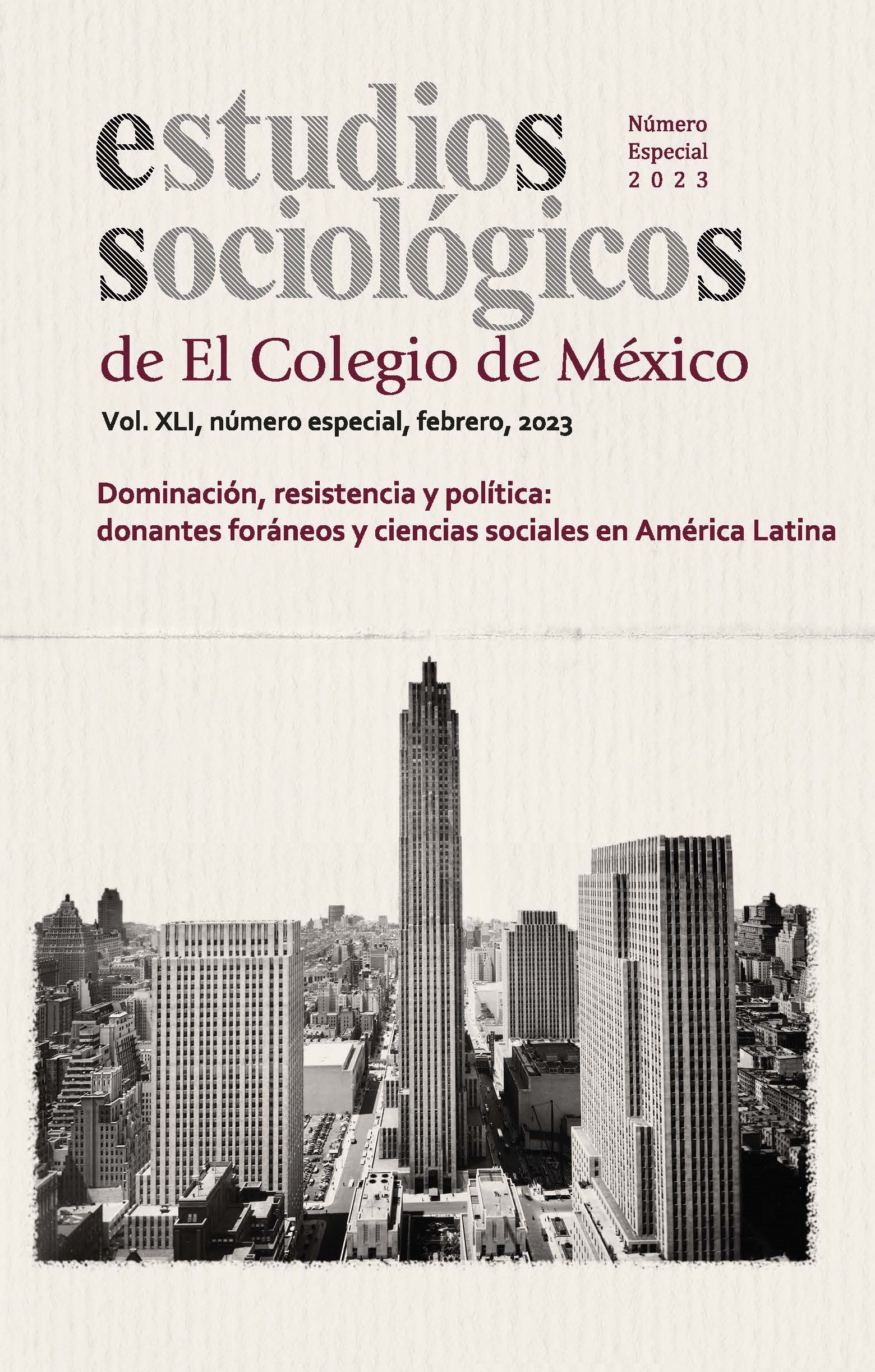América Latina en el mundo: las Naciones Unidas, los cepalinos y los dependendistas
DOI:
https://doi.org/10.24201/es.2023v41nEspecial.2364Palabras clave:
ciencias sociales, organizaciones internacionales, CEPAL, dependencia, desarrolloResumen
Esta nota de investigación introduce algunas de las ideas discutidas en el libro The World that Latin America Created (Fajardo, 2022) que contribuyen a entender el rol de las organizaciones internacionales en América Latina tanto en la esfera intelectual como en la política. Las Naciones Unidas, una organización internacional frecuentemente asociada con los intereses norteamericanos en la esfera global, se convirtió en América Latina en el epicentro de una ciencia social autodefinida como de carácter regional pero cuyos alcances fueron a escala mundial. La nota y el libro se enfocan en el movimiento intelectual centrado en la Comisión Económica para América Latina (CEPAL) y en el impacto político de los cepalinos y los dependentistas, sus mayores críticos.
Descargas
Citas
Adelman, Jeremy, & Fajardo, Margarita (2016). Between Capitalism and Democracy: The Political Economy of Social Science in Latin America, 1968-1980. Latin American Research Review, 51(3), 3-22. DOI: https://doi.org/10.1353/lar.2016.0031
Beigel, Fernanda (2009). La Flacso chilena y la regionalización de las ciencias sociales en América Latina. Revista Mexicana de Sociología, 71(2), 319-49.
Bielschowsky, Ricardo (1998). Cincuenta años del pensamiento de la CEPAL. Santiago: Fondo de Cultura Económica-CEPAL.
Cullather, Nick (2010). The Hungry World: America’s Cold War Battle Against Poverty in Asia. Cambridge: Harvard University Press. DOI: https://doi.org/10.4159/9780674058828
Cardoso, Fernando Henrique, & Faletto, Enzo (1969). Dependencia y desarrollo en América Latina. México: Siglo XXI.
Dosman, Edgar (2008). The Life and Times of Raúl Prebisch. Montreal: McGill-Queen’s University Press. DOI: https://doi.org/10.1515/9780773574649
Eckbladh, David (2010). The Great American Mission: Modernization and the Construction of the American World Order. Princeton: Princeton University Press. DOI: https://doi.org/10.1515/9781400833740
Fajardo, Margarita (2022). The World that Latin America Created. Cambridge: Harvard University Press. DOI: https://doi.org/10.4159/9780674270039
Fitzgerald, E.V.K (1994). ECLA and the Formation of Latin American Doctrines. En Rock (ed.), Latin America in the 1940s: War and Postwar Transitions. Berkeley and Los Angeles: University of California Press. DOI: https://doi.org/10.1525/9780520328099-010
Franco, Rolando (2009). La Flacso clásica: vicisitudes de las ciencias sociales latinoamericanas. Santiago: Flacso.
Furtado, Celso (1989). La fantasía organizada. Bogotá: Tercer Mundo Editores.
Helleiner, Eric (2014). Forgotten Foundations of Bretton Woods: International Development and the Making of the Postwar Order. Ithaca and London: Cornell University Press.
Hirschman, Albert (1963). Journeys toward Progress: Studies of Economic Policy-Making in Latin America. New York: The Twentieth Century Fund.
Iber, Patrick (2018). Social Science, Cultural Imperialism, and the Ford Foundation in Latin America in the 1960s. En Chaplin, & Mooney (eds.), The Global 1960s: Convention, Contest, and Counterculture. New York: Routledge. DOI: https://doi.org/10.4324/9781315200828-6
Laiz, Álvaro Morcillo (2022). The Cold War Origins of Global IR. The Rockefeller Foundation and Realism in Latin America. International Studies Review, 24(1). DOI: https://doi.org/10.1093/isr/viab061
Latham, Michael (2000). Modernization as Ideology: American Social Science and Nation-Building in the Kennedy Era. Chapel Hill and London: University of North Carolina Press.
Love, Joseph (1995). Economic Ideas and Ideologies in Latin America since 1930. En Bethell (ed.), The Cambridge History of Latin America. Cambridge: Cambridge University Press. DOI: https://doi.org/10.1017/CHOL9780521232265.008
Markoff, John, & Montecinos, Veronica (2001). From the Power of Economic Ideas to the Power of Economists. En Centeno, & López-Alves (eds.), The Other Mirror: Grand Theory through the Lens of Latin America. Princeton: Princeton University Press. DOI: https://doi.org/10.1515/9780691222561-007
Merkel, Ian (2022). Terms of Exchange: Brazilian Intellectuals and the French Social Sciences. Chicago: University of Chicago Press. DOI: https://doi.org/10.7208/chicago/9780226819372.001.0001
Mitchell, Timothy (2002). The Rule of Experts: Egypt, Techno-Politics, Modernity. Berkeley and Los Angeles: University of California Press. DOI: https://doi.org/10.1525/9780520928251
Plotkin, Mariano (2014). US Foundations, Cultural Imperialism and Transnational Misunderstanding: the Case of the Marginality Project. Journal of Latin American Studies, 47(1), 65-92. DOI: https://doi.org/10.1017/S0022216X14001473
Prebisch, Raúl (1950). The Economic Development of Latin America and its Principal Problems. New York: United Nations.
Sikkink, Kathryn (1991). Ideas and Institutions: Developmentalism in Brazil and Argentina. Ithaca: Cornell University Press.
Silva, Patricio (2008). In the Name of Reason: Technocrats and Politics in Chile. University Park: Pennsylvania State University Press.
Sorj, Bernardo (2008). A construção intelectual do Brasil contemporâneo, da resistência à ditadura ao governo FHC. Rio de Janeiro: Centro Edelstein de Pesquisas Sociais. DOI: https://doi.org/10.7476/9788599662472
Rodríguez, Octavio (1980). La Teoría del Subdesarrollo de la CEPAL, México: Siglo XXI.
Thornton, Christy (2021). Revolution in Development: Mexico and the Governance of the Global Economy. Los Angeles and Berkeley: University of California Press.
Toye, John, & Toye, Richard (2004). The UN and Global Political Economy. Bloomington: Indiana University Press. DOI: https://doi.org/10.2979/3212.0
Publicado
Cómo citar
-
Resumen877
-
PDF446
-
XML34
Número
Sección
Licencia

Esta obra está bajo una licencia internacional Creative Commons Atribución-NoComercial-SinDerivadas 4.0.
Las personas autoras que tengan publicaciones con esta revista, aceptan los términos siguientes:
a) Conservarán sus derechos de autoría y garantizarán a la revista el derecho de primera publicación de su obra, el cuál estará simultáneamente sujeto a la Licencia de reconocimiento de Creative Commons que permite a terceros compartir la obra siempre que se indique su autor y su primera publicación esta revista.
b) Podrán adoptar otros acuerdos de licencia no exclusiva de distribución de la versión de la obra publicada (p. ej.: depositarla en un archivo telemático institucional o publicarla en un volumen monográfico) siempre que se indique la publicación inicial en esta revista.
c) La persona autora sólo podrá difundir la obra hasta terminado el proceso de envío y dictaminación con el propósito de preservar el anonimato a los pares que lo evalúan.






